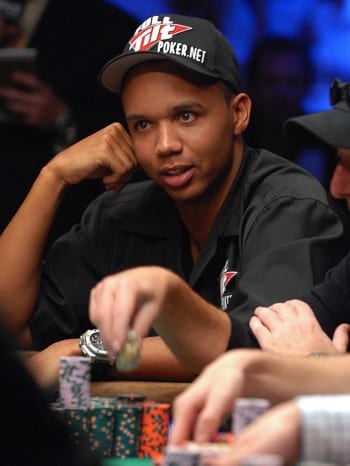 Gambling has been a popular pastime for centuries and with the advent of technology and online gaming, it has become more accessible than ever before. With this increase in availability, with everyone having an electronic Las Vegas in their pocket, there has been a rise in the number of professional gamblers. But what exactly is a professional gambler and what do they do? At its core, gambling involves risking money on the outcome of an event in the hopes of winning more money back. Professional gamblers, however, take this concept to the next level.
Gambling has been a popular pastime for centuries and with the advent of technology and online gaming, it has become more accessible than ever before. With this increase in availability, with everyone having an electronic Las Vegas in their pocket, there has been a rise in the number of professional gamblers. But what exactly is a professional gambler and what do they do? At its core, gambling involves risking money on the outcome of an event in the hopes of winning more money back. Professional gamblers, however, take this concept to the next level.
They make a living by gambling, often relying on their skills, knowledge, and experience to consistently win more money than they lose. One common misconception about professional gamblers is that they are simply lucky individuals who have found a way to beat the odds. Whilst luck certainly plays a role in any type of gambling, professional gamblers rely heavily on their understanding of the games they play, as well as their ability to read and exploit their opponents. In fact, many professional gamblers specialise in one particular game or type of betting.
Professional Gamblers Are Experts in Certain Areas
It is not uncommon for professional gamblers to focus on certain areas, such as sports betting. Others may focus on casino games, like poker or blackjack. By honing their skills and knowledge in a specific area, professional gamblers are able to gain an edge over their opponents and increase their chances of winning. That being said, becoming a professional gambler is no easy feat. It requires a significant amount of time, effort and dedication. Professional gamblers need to develop their skills and knowledge in their chosen area of expertise in order to ensure that they’re not caught out.
This also allows them to focus on what they know. If they are experts in football, for example, then they won’t allow themselves to be sidetracked by betting on something strange like Ukrainian wrestling. They stick to their areas of expertise and if there isn’t anything that they know well available for betting then they simply don’t bet. They won’t place wagers just for the sake of having a bet going, knowing that that is a sure-fire way to lose the money that they’ve built up. Instead, they will keep their powder dry until they sense that there is money to be made.
This includes knowledge of the rules, strategies and odds of what they’re betting on. Many professional gamblers specialise in a particular game, such as poker or blackjack, and spend hours studying and practicing to perfect their skills. Whilst some professional gamblers rely solely on their own knowledge and expertise, others collaborate with a team of professionals to analyse data and make informed decisions. For example, in sports betting, professional gamblers may work with a team of analysts to look at data and trends to make more accurate predictions.
Traits of a Professional Gambler

As well as ensuring they know their chosen area well, professional gamblers also need to be able to manage their bankroll effectively and handle the emotional highs and lows that come with gambling.
Handling the Highs & Lows
One key factor in the success of professional gamblers is their ability to control their emotions. Losing streaks and bad bets are a common occurrence in gambling, and it can be easy to let these losses affect one’s decision-making abilities. Professional gamblers, however, are able to remain calm and focused, even in the face of adversity.
Taking Calculated Risks
They understand that emotions can cloud judgment and do what they can to make rational decisions based on their knowledge and experience. In essence, professional gamblers make a living by taking calculated risks and using their skills and what they have learned to consistently win more money than they lose. This is only possible when they are able to remove emotion from the equation and look at the blunt facts of what is in front of them. Rather than being upset that they’ve lost, they will look at how it impacts their bankroll and plan their next move accordingly.
One of the most important skills that professional gamblers possess is the ability to manage their risk. Unlike casual gamblers, who are often driven by emotion and adrenaline, professional gamblers are disciplined and methodical in their approach. They know how to calculate the odds of a particular game or bet and they are able to assess the level of risk involved in any given situation. They also know when to walk away from a game or bet that is not in their favour, which is a crucial part of managing risk and avoiding big losses.
Bankroll Management
Another important aspect of professional gambling is bankroll management. Professional gamblers must be able to manage their money effectively, knowing when to bet big and when to cut their losses. This requires a solid understanding of probability and risk management, as well as discipline and self-control. Despite the challenges and risks involved, professional gambling can be a highly lucrative career for those who are successful. Many professional gamblers make six-figure salaries or more, and some have even become millionaires through their gambling.
However, it is important to note that professional gambling is not for everyone. It requires a unique combination of skill, knowledge, discipline and risk tolerance, as well as a willingness to accept the potential for losses and the emotional toll that comes with them. The key to all of that is being able to keep control of your bankroll, knowing how much is in it at any one time and tracking what the wins and losses are in much the same way that any business would have a detailed knowledge of their P&L. After all, we’re not just talking about people who have won a few bets.
Professional Doesn’t Mean They Never Lose
Professional gambling is not an assured path to riches. As with any form of investment or risk-taking, there is always the potential for losses and it is important to have a solid understanding of the risks involved before diving in. A misconception about professional gamblers is that they are always successful and have no chance of losing money. This couldn’t be further from the truth. As with any other career or business, there are ups and downs and professional gamblers experience losses with the best of us, with how they cope being key to their success.
In fact, most professional gamblers operate a practice of allocating a certain amount of money for gambling purposes and only risking a small percentage of that amount on each individual bet. This strategy helps to minimise the risk of significant losses and allows the gambler to continue operating even during a losing streak. One of the keys to being a successful professional gambler is discipline. Professional gamblers need to be disciplined in both their gambling habits and their daily routines. They need to be able to control their emotions and avoid chasing losses.
They Work Very Hard
Professional gambling is not a get-rich-quick scheme. It requires dedication, hard work and a willingness to continually learn and adapt. Successful professional gamblers often have a schedule that is similar to that of a typical 9-5 job, meaning that they treat gambling as a serious business. In addition to the technical skills required for professional gambling, there are also certain personal characteristics that can contribute to success in this field. For example, professional gamblers need to have a high level of self-motivation, as they are often working independently.
This means that they need to stay focused and productive without a boss or manager watching over them. They need to be comfortable with risk-taking, given the fact that gambling inherently involves taking risks. Professional gamblers are often individuals who have turned their passion for gambling into a career, working hard to develop a deep understanding of mathematics, probability theory and game theory. These are the tools that they use to gain an edge over the casinos and other players, as well as to consistently turn a net win over the long-term.
They Are Masters of Psychology
It is easy to think that being a professional gambler involves nothing more than being good at betting on football or understand the odds of poker. In reality, one of the key skills that professional gamblers possess is the ability to read people. This is especially important in games such as poker, where players must rely on their ability to bluff and read their opponents’ tells. Professional gamblers are able to pick up on subtle cues, such as facial expressions, body language and tone of voice, which allow them to make more accurate assessments of their opponents’ hands and make better decisions.
Although they know the rules, strategies and nuances of each game, the key thing is that they are able to exploit weaknesses in their opponents’ play. In that sense, they are master psychologists, thinking not only about their own play but also the play of their opponents in games that involve them taking on other people. Whilst that might not do much good when taking on the casino, given croupiers and dealers don’t have to make decisions on their play, it can end up being the difference between success and defeat when faced with a physical opponent.
One of the most important traits that professional gamblers possess is patience. They understand that success in gambling is not about making a quick buck, but about making consistent net wins over the long-term. They are willing to wait for the right opportunities to present themselves and are not tempted by short-term gains that could lead to bigger losses in the future. This is another area of psychological mastery that professionals need to ensure they’re on top of. Anyone that is sucked in by the temptation to bet on something that they don’t understand won’t last long.
What Makes a Gambler a ‘Professional’?

When we talk of professional gamblers, we’re obviously not talking about people who have won the occasional bet. We are also not talking about people who have won tens or hundreds of millions on the lottery, meaning that they no longer need to work. Instead, we’re talking about people who make their money from gambling as their primary income. They will use the likes of exchanges to make regular money at the smaller end of the scale, whilst at the larger end of the pie are the likes of professional poker players who regularly win on the World Poker Tour and the likes.
Whilst names like Phil Ivey and Erik Seidel will be known to most people thanks to their exploits in World Series of Poker and other such competitions, there are plenty of other professional gamblers that you might not know much about. Zeljko Ranogajec is one such example. Born in Australia in 1961, he studied Commerce and Law at the University of Tasmania, which was where he began counting cards. This form of advantage gambling became his stock in trade, leading him to the likes of America to take on some of the country’s biggest casinos.
In 1994, he bet ‘significantly more’ than AU$7.5 million in order to win an AU$7.5 million Keno prize, actually walking away with more than he’d wagered thanks to the side bets and other prizes that he won along the way. It is a good example of the sort of thing that a professional gambler will look to do: invest huge sums of money in order to try to secure a net win. By the time he first appeared in the Australian Financial Review Rich List in 2019, he was believed to have a personal fortune of around AU$600 million, with the majority of that gained from his professional gambling exploits.